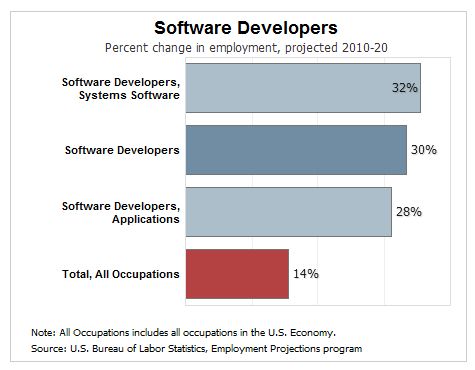Only a fraction of developers are actively looking for a new job, according to the latest developer survey from Stack Overflow. Some 62.1 percent of developers said they weren’t actively looking for a new job, but open to potential opportunities; another 24.8 percent weren’t interested at all in something new, while 13.1 percent described themselves as actively looking. But not all tech pros are created equal when it comes to interest in job hunting. For example, some 14.3 percent of machine-learning specialists said they were actively looking for a new job, ahead of other categories such as data scientist (13.2 percent), mobile developer (12.8 percent), quality assurance engineer (12.2 percent), and developers with statistics or mathematical background (12.2 percent). Here’s the full breakdown:  In terms of assessing potential jobs, “developers prioritized opportunities for professional development over any other factor by a large margin,” Stack Overflow wrote in the report accompanying the data. “This could mean they're looking to advance up the ranks, but it could also be a sign of developers wanting to stay ahead of the game with their company's help. Software is one of the most rapidly changing industries in history; it takes considerable work to keep skills sharp.” In terms of compensation, developers most prize vacation/days off (57 percent), followed by the option to work remotely (53.3 percent), health benefits (47.1 percent), expected work hours (44.3 percent), and “equipment,” which presumably means access to the latest and greatest stuff (40.1 percent). They tended to care far less about things like long-term leave (14.4 percent), a private office (11.6 percent), or access to child/elder care (9.1 percent). What sort of portrait does this paint of your “average” developer? They aren’t really on the lookout for a new gig, although they’re potentially interested in an opportunity that would allow them to develop their career. They care highly about vacation time and working remotely. Are any of those conclusions surprising? Not really. For example, tech pros have told Dice in multiple surveys that they value remote work and flexible hours above other employer perks; and vacation time is always welcome. But why are machine-learning specialists and data scientists the most interested in new positions? That might be a reflection of the burgeoning market for A.I. and machine learning, which has led to a proliferation of opportunities. With so many new jobs spring up, many at cutting-edge companies, who wouldn’t be looking around?
In terms of assessing potential jobs, “developers prioritized opportunities for professional development over any other factor by a large margin,” Stack Overflow wrote in the report accompanying the data. “This could mean they're looking to advance up the ranks, but it could also be a sign of developers wanting to stay ahead of the game with their company's help. Software is one of the most rapidly changing industries in history; it takes considerable work to keep skills sharp.” In terms of compensation, developers most prize vacation/days off (57 percent), followed by the option to work remotely (53.3 percent), health benefits (47.1 percent), expected work hours (44.3 percent), and “equipment,” which presumably means access to the latest and greatest stuff (40.1 percent). They tended to care far less about things like long-term leave (14.4 percent), a private office (11.6 percent), or access to child/elder care (9.1 percent). What sort of portrait does this paint of your “average” developer? They aren’t really on the lookout for a new gig, although they’re potentially interested in an opportunity that would allow them to develop their career. They care highly about vacation time and working remotely. Are any of those conclusions surprising? Not really. For example, tech pros have told Dice in multiple surveys that they value remote work and flexible hours above other employer perks; and vacation time is always welcome. But why are machine-learning specialists and data scientists the most interested in new positions? That might be a reflection of the burgeoning market for A.I. and machine learning, which has led to a proliferation of opportunities. With so many new jobs spring up, many at cutting-edge companies, who wouldn’t be looking around?


